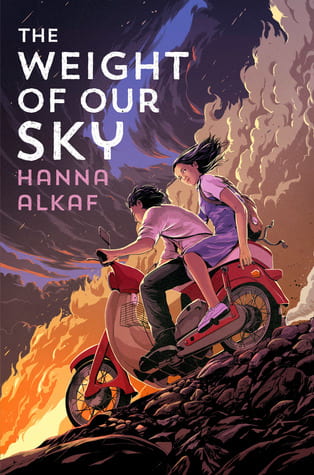Today we had a Writer’s Fortnight session with the Malay author Hanna Alkaf. Hanna Alkaf graduated with a degree in journalism from Northwestern University and spent over ten years writing everything but fiction before finally giving in. She now writes “unapologetically” Malaysian young adult and middle-grade stories. The Weight of Our Sky is her first novel.
Hanna was first explaining to us the importance of knowledge of different mental illnesses. She explained how in Malaysia there was a lack of information about mental illnesses and psychologists refused to provide new adapted information. Through this session, I realized that developing a mental illness was a process and so was coping with it. There were several mental illnesses that we covered today, these being OCD (obsessive-compulsive disorder), schizophrenia, depression, ADHD (attention deficit hyperactivity disorder). During the talk, there were many of us who actually did not know the meaning of many of these disorders and were confusing them with other disorders. We learnt about how it was important to value people with “mental problems” and how it was important to help people who don’t know what they are experiencing.
Hanna then moved onto describing her book “The Weight of Our Sky” which is about a music-loving teen with OCD who does everything she can to find her way back to her mother during the historic race riots in 1969 Kuala Lumpur, Malaysia. Melati Ahmad the main character is like your typical movie-going, Beatles-obsessed sixteen-year-old. However, the main character believes that she harbours a “djinn” inside her, one who threatens her with horrific images of her mother’s death unless she adheres to an elaborate ritual of counting and tapping to keep him satisfied. A “djinn” is an intelligent spirit of lower rank than the angels, able to appear in human and animal forms and to possess humans.
[continuation of plot] “A trip to the movies after school turns into a nightmare when the city erupts into violent race riots between the Chinese and the Malay. When gangsters come into the theatre and hold movie-goers hostage, Mel, a Malay, is saved by a Chinese woman but has to leave her best friend behind to die. On their journey through town, Mel sees for herself the devastation caused by the riots. In her village, a neighbour tells her that her mother, a nurse, was called in to help with the many bodies piling up at the hospital. Mel must survive on her own, with the help of a few kind strangers, until she finds her mother. But the djinn in her mind threatens her ability to cope.”
From this story, Hanna explains how she suffered from Postpartum Depression (PPD) which is a complex mix of physical, emotional, and behavioural changes that happen in a woman after giving birth. She explained how after giving birth everything became difficult for her and her life wasn’t going on the course she wanted it to. She then connected this to her previous story, Gila: A Journey Through Moods & Madness (Gila means crazy) which she wrote to represent communities in Malaysia who suffered from a mental disorder and were not able to get help, similar to her situation.
In my opinion, I think that it is really promising that authors are now focusing on writing and representing the marginalised communities in Asia through stories especially because differently-abled communities are sometimes a taboo or a less understood subject. There are many people in this region of the world who are unaware of the problems that they face and why. Sometimes they are unaware of how to even deal with their problems which is why books as such are encouraging for certain communities.

